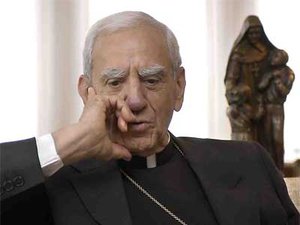By David O’Reilly
Philadelphia Inquirer
February 22, 2011
http://www.philly.com/philly/news/breaking/20110222_HED_TOO_LONG__SNAP__Letters_say_Bevilacqua_sought_reassignment_of_sexually_abusive_p.html
 |
| Rev. Anthony Bevilacqua, 87, served as the Roman Catholic archbishop of Philadelphia from 1988 until his retirement in 2003. (File photo) |
As an adviser to the bishop of Brooklyn, N.Y., in the early 1980s, then-Auxiliary Bishop Anthony J. Bevilacqua recommended that a sexually abusive priest wishing to return after treatment "seek an assignment outside the diocese," according to letters released Tuesday by an advocacy group.
The Rev. Roman Ferraro went on to the Diocese of Metuchen, N.J., in which he molested two young boys a few years later. The victims reached an out-of-court settlement with the diocese.
In 2004, Ferraro was convicted of child sexual assault for abusing a Massachusetts boy in the 1970s. Now 76, he is serving a life sentence.
"These documents raise the question of whether this was Bevilacqua's way of dealing with [abuser] priests" throughout his long career as a prelate, Barbara Blaine, national president of the Survivors' Network of Those Abused by Priests (SNAP), said at a news conference outside the Cathedral Basilica of SS. Peter and Paul.
The letters and memos SNAP released Tuesday were obtained from the Brooklyn Diocese by a Miami law firm that brought a civil suit in 2005 against Ferraro and the diocese, which settled out of court. The plaintiff had been abused as a boy in 1969, when Ferraro was serving as a military chaplain in Key West, Fla.
The Brooklyn Diocese "fought tooth and nail" for four years to prevent release of Ferraro's personnel records - a total of 1,200 pages - according to the plaintiff's attorney, Jessica Arbour.
Bevilacqua was an adviser to Brooklyn's bishop in the 1970s and was auxiliary bishop there in the early 1980s. He served as bishop of Pittsburgh from 1983 to 1988 and cardinal archbishop of Philadelphia from 1988 until his retirement in 2003.
Blaine called on the district attorneys of Kings County, N.Y., and Allegheny County, Pa., to conduct grand jury investigations into those dioceses' handling of sexually abusive clergy during Bevilacqua's time.
The Archdiocese of Philadelphia, the Diocese of Brooklyn, and the law firm of Stradley Ronon, which represents the archdiocese, did not respond to The Inquirer's requests for comment.
Two Philadelphia grand jury reports, issued in 2005 and earlier this month, have been sharply critical of Bevilacqua's handling of abusive clergy, accusing him and others in the local hierarchy of concealing priests' criminal behavior from law enforcement while systematically reassigning them to other parishes.
The 2011 grand jury indicted Msgr. William Lynn, Bevilacqua's longtime secretary for clergy, on two felony counts of endangering the welfare of children for recommending the assignment of several priests who allegedly abused minors in the 1990s.
The grand jury said it strongly considered similar charges against the 87-year-old cardinal, reportedly in poor health, but concluded it lacked enough evidence to link him to those assignments.
According to Ferraro's personnel file, he first recognized his attraction to minors in 1955, when he was a 21-year-old seminarian. His file also cites numerous references to his "immaturity" and unfitness for ordination.
The first apparent reference to a sexual assault appears in a letter Ferraro wrote on July 1, 1973, to Bishop Francis Mugavero acknowledging some "unfortunate difficulty" he caused in his parish. He asked Mugavero to find a pretext for removing him from the parish so that he could leave "with honor."
Months later, Ferraro's psychotherapist advised the archdiocese against any assignment for Ferraro "with young boys or teenagers" pending successful completion of therapy.
In January 1977, however, an unsigned memo copied to Bevilacqua recounted that Ferraro had been working for the previous 18 months at a parish in the adjacent Diocese of Rockville Centre when he "grabbed one of the young boys" after a home Mass and then queried two other boys about masturbation. The Rockville Centre Diocese promptly dismissed Ferraro, who returned to Brooklyn.
In 1980, he was sent to Affirmation House, a treatment center for priests in Missouri. After his therapy, the Archdiocese of St. Louis permitted him to serve as a hospital chaplain during treatment while residing in a parish rectory.
In 1983, Ferraro wrote to officials of the Brooklyn Diocese asking to be allowed to return. But the diocese's director of priest personnel advised Mugavero that Bevilacqua was concerned that "an assignment in the diocese would be too much of a risk."
The director continued: "Bishop Bev[i]lacqua recommends that you write to him [Ferraro] as follows: 'It would not be appropriate for you to be assigned in the Diocese of Brooklyn. I urge you to seek an assignment outside the diocese.' "
On Sept. 3, Bevilacqua posted a memo in Ferraro's personnel file. The Archdiocese of New York had offered Ferraro an assignment, he noted, and added, "We would not be adverse to having him take an assignment in the archdiocese."
A month later, Bevilacqua left Brooklyn to head the Diocese of Pittsburgh.
In January 1984, Mugavero wrote to Ferraro and, using Bevilacqua's words, advised him "to seek an assignment outside the diocese."
Six months later, the Diocese of Metuchen accepted him for parish ministry. In 1986 or 1987, according to Arbour's copy of diocesan files, he sexually assaulted the two boys.
Contact staff writer David O'Reilly at 215-854-5723 or doreilly@phillynews.com
Any original material on these pages is copyright © BishopAccountability.org 2004. Reproduce freely with attribution.